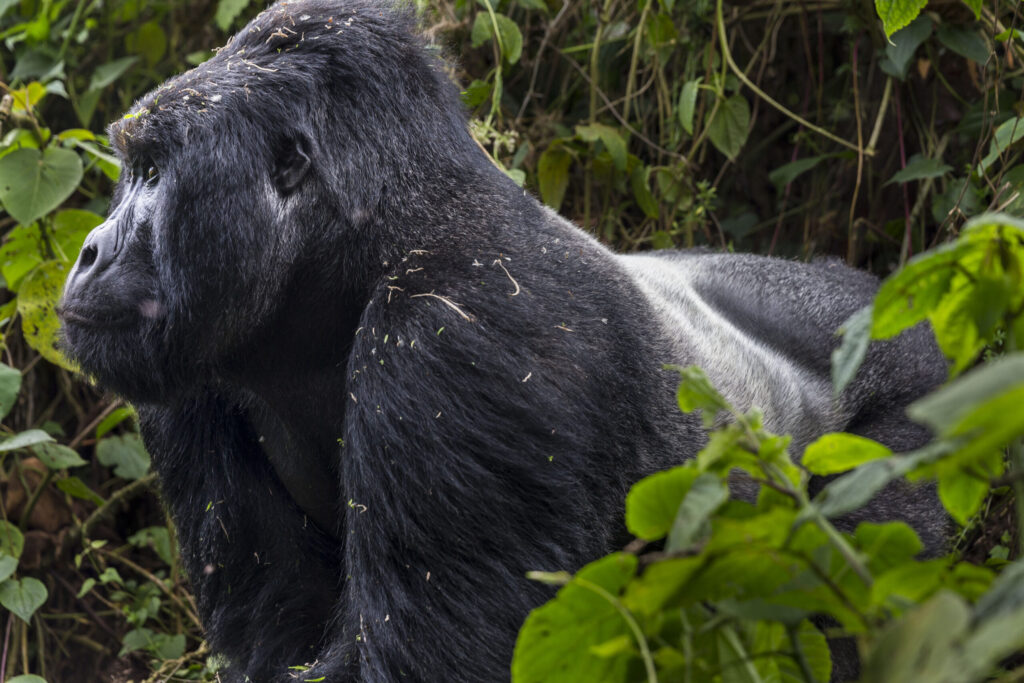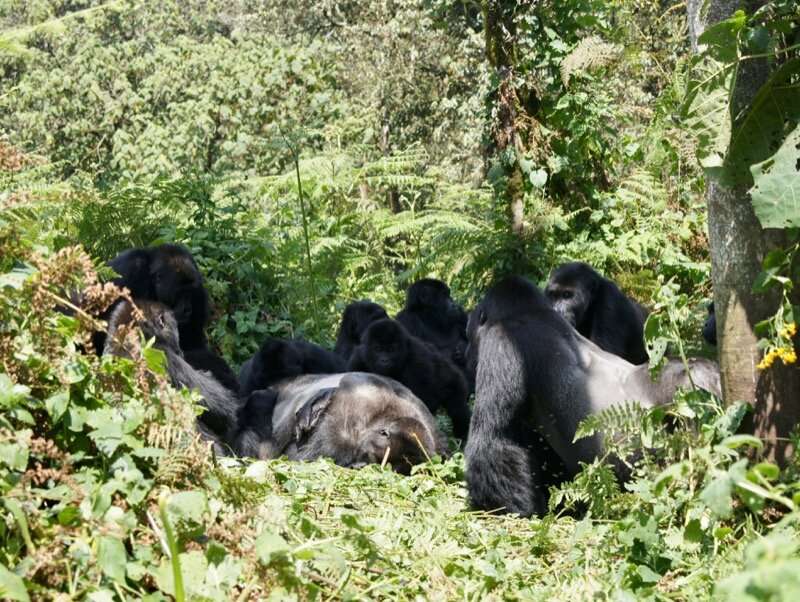Why Silverback Gorillas Fight

Why Silverback Gorillas Fight: Gorilla trekking safaris help our comprehension of the nature, behaviors, and daily lifestyles of gorillas in their native environments. There are multiple reasons why silverback gorillas engage in combat. Leadership transitions, referred to as dominance, transpire in various manners periodically. The cause may be the demise of the dominant silverback, or it could be from a solitary silverback encroaching and presenting a challenge, typically by persuading one or more females to migrate to him. Solitary individuals are particularly intriguing as they often have a more ambitious disposition compared to those who remain within their native groups and prioritize teamwork and group cohesion. Observing two solitary silverbacks contending for dominance within a group is rare.
In a combative state, male gorillas are formidable adversaries owing to their incisive fangs and immense power. Consequently, the majority of disputes are resolved by displays and other threatening behaviors rather than physical confrontations, ensuring that no individuals are harmed. Gorillas are renowned for their display behaviors, which encompass chest beating and vocal hooting. The chest thump of silverback males is really impressive. When two groups of gorillas meet, the dominant silverbacks may engage in lethal combat, mostly employing their keen teeth to inflict severe, gaping wounds.
Why Silverback Gorillas Fight
A silverback gorilla’s duties encompass, among other tasks, protecting the family, constructing nests, foraging for sustenance, nurturing the young, and mating with females. The sole male in the group mates with the females and prohibits other males from doing so; thus, attempts by other silverbacks to mate with his females frequently incite conflict within the group.
The male that attempts to mate without the head silverback’s agreement is typically expelled from the group and may abduct several members to establish his own family.
When a member of the group disobeys the dominant Silverback’s commands, the other members engage in conflict. When a younger silverback perceives himself capable of leading the group, he will attempt to usurp the leader, culminating in a brutal conflict where the victor assumes control of the family. Gorillas also engage in warfare to save their families from threats or intruders; when two groups encounter one another, silverbacks often participate in confrontations.
Reproduction
Another reason gorillas Why Silverback Gorillas Fight is when individuals within a gorilla family attempt to mate with the adult females of that family. The dominant silverback in a gorilla troop possesses exclusive mating rights with all adult females; consequently, any male attempting to mate with these females may engage in combat with the dominant male. In certain cases, the intruding male may be expelled from the troop to prevent future conflicts and maintain harmony within the group.
Territorial takeover
Each gorilla family possesses a designated territory; however, when different families intrude upon one another’s domains, conflicts may arise to defend these territories. These areas are crucial for nest construction, food availability, and protection from predators such as leopards and external threats.
Food insufficiency
The reasons for food scarcity have also resulted to conflicts among gorillas and other animals. Numerous confrontations have been documented between chimpanzees and gorillas during periods of food scarcity in the wild, as other primates intrude upon each other’s territory in search of sustenance, potentially resulting in lethal altercations. During the poaching and capture of gorilla infants, adult gorillas exhibit aggressive behavior towards humans to defend their families. Due to their considerable strength, many are killed in the process of capturing the infants. This has significantly contributed to the endangerment of gorillas, as they are hunted by humans and predators for sustenance.
Gorilla versus Chimpanzee
Gorillas and chimpanzees inhabit the same ecosystem and consume several identical plant species over most of Africa, rendering them competitors. This becomes more evident when the fruit matures, attracting both species to the same tree. The two species typically avoid one other, however they occasionally coexist amicably in the same tree when feeding. Nevertheless, their confrontations occasionally result in fatalities. Two incidents from Gabon have been documented, wherein the more populous chimpanzees expelled the gorillas and killed a newborn gorilla.
Where can Silverback Gorillas be located?
Nonetheless, gorillas are tranquil and gregarious creatures that necessitate space when they display signs of agitation, and your ranger guide will instruct you on the appropriate actions to take if the gorillas exhibit any signs of discomfort. They coexist contentedly with their families, engage in play, assist one another as necessary, and provide mutual protection, as you will observe during your gorilla trek in Bwindi Impenetrable National Park in Uganda, Mgahinga National Park in Uganda, Volcanoes National Park in Rwanda, or Virunga National Park in the Democratic Republic of the Congo.
Cost of Gorilla Trekking Permits in Rwanda, Uganda, and Congo
The charge for a gorilla trekking permit in Rwanda, Uganda, and the Democratic Republic of Congo varies according on the specific country visited during the gorilla trekking safari. Each of these countries imposes distinct fees for gorilla permits: USD 800 in Uganda, USD 1,500 in Volcanoes National Park in Rwanda, and USD 400 in the Democratic Republic of the Congo.
What is the maximum number of individuals permitted to track a gorilla group?
A group of up to eight individuals is authorized to trek once daily, and when locating the group, you may remain with them for a maximum of one hour. When travelers encounter these intriguing woodland primates, it is typically an exhilarating experience.
Conclusion: While uncommon, it is feasible for participants on a gorilla trekking safari in Rwanda, Uganda, or Congo to observe a confrontation between two silverback gorillas. In the event of encountering such an uncommon situation, guests are urged to remain composed and adhere to the directives of their guide to ensure safety and prevent any detrimental confrontations with the silverback gorillas.


